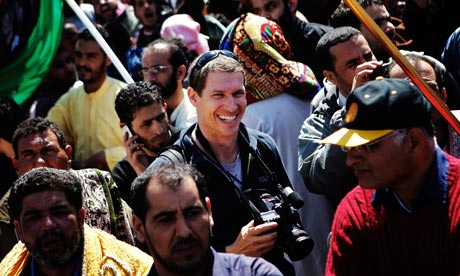
The question of the exact cause, and exact number, of non-combatant casualties in Libya has been put into sharp focus. One of the latest civilian victims is the award-winning photojournalist and Oscar-nominated film-maker Tim Hetherington, who was killed in Misrata just after tweeting that the attacks on the city were coming from Muammar Gaddafi and not Nato.
With Sebastian Junger he created the extraordinarily powerful documentary Restrepo, about a US platoon's mission to build and defend a forward outpost in the terrifyingly dangerous Korengal valley in Afghanistan. The outpost was named after an army medic, Juan Restrepo – killed on the first day of their tour of duty.
Hetherington and Junger show how this naming was an act of defiance as well as remembrance – a way in which a bunch of very scared young men could impose their identities on an alien, hostile landscape. It was also a way of containing and controlling their fear of death.
Hetherington's own terrible fate shows that the fear and danger with which his film was saturated was not a Hollywood device or a journalist's macho rhetoric. They were actually present.
Hetherington began his career as a stills photographer – though he and Junger appear genuinely to have shared the filming and directing responsibilities on Restrepo. It was an inspired collaboration, but Junger must surely have relied greatly on Hetherington's razor-sharp visual sense. The images in Restrepo are viscerally powerful. There's an incredible moment when the film, having shown us these soldiers getting aboard a helicopter, switches to their point-of-view as they look down into the valley from hundreds of metres above. It is a moment of pure vertigo: you can feel your heart plunge into your boots.
When these men were under fire, Hetherington was under fire, too, and arguably in more danger: he was armed only with a camera. But perhaps the film's most extraordinary scene was one that was (ostensibly) calm. One of the soldiers is being interviewed afterwards about his experiences. Mid-sentence, he stops; he can't carry on. It is not simply that he is emotional – he is in the middle of a flashback, actually caught on camera remembering horrifying events he had clearly suppressed until that moment.
To understand the realities of a warzone, to transmit those realities back to us, Hetherington put himself in harm's way: a brilliant journalist and a courageous, radical film-maker.

